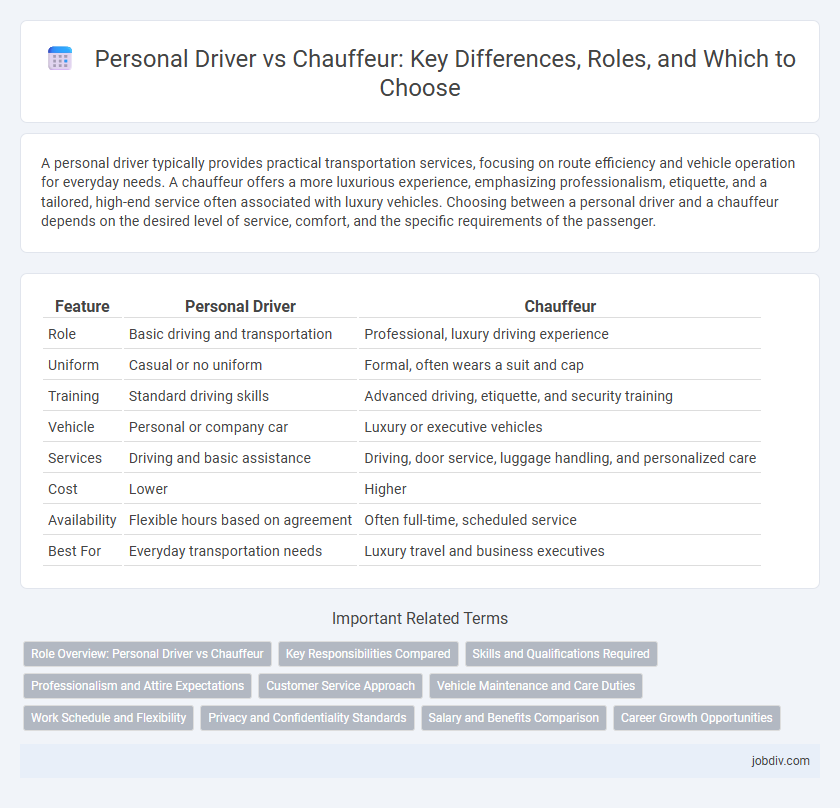A personal driver typically provides practical transportation services, focusing on route efficiency and vehicle operation for everyday needs. A chauffeur offers a more luxurious experience, emphasizing professionalism, etiquette, and a tailored, high-end service often associated with luxury vehicles. Choosing between a personal driver and a chauffeur depends on the desired level of service, comfort, and the specific requirements of the passenger.
Table of Comparison
| Feature | Personal Driver | Chauffeur |
|---|---|---|
| Role | Basic driving and transportation | Professional, luxury driving experience |
| Uniform | Casual or no uniform | Formal, often wears a suit and cap |
| Training | Standard driving skills | Advanced driving, etiquette, and security training |
| Vehicle | Personal or company car | Luxury or executive vehicles |
| Services | Driving and basic assistance | Driving, door service, luggage handling, and personalized care |
| Cost | Lower | Higher |
| Availability | Flexible hours based on agreement | Often full-time, scheduled service |
| Best For | Everyday transportation needs | Luxury travel and business executives |
Role Overview: Personal Driver vs Chauffeur
A personal driver typically provides basic driving services, focusing on safe and efficient transportation from point A to B, while a chauffeur offers luxury, professionalism, and personalized assistance, often including vehicle maintenance and client confidentiality. Chauffeurs are trained to deliver a premium experience, including knowledge of etiquette, route planning, and managing schedules. The role of a personal driver centers on practicality and reliability, whereas a chauffeur combines driving skills with high-end service and discretion.
Key Responsibilities Compared
A personal driver primarily focuses on safely transporting the employer for daily errands, appointments, and short trips, often managing vehicle maintenance and route planning. Chauffeurs provide a higher level of service by ensuring a luxury, discreet experience, including assisting with luggage, opening doors, and maintaining the cleanliness of premium vehicles. Both roles require excellent driving skills and punctuality, but chauffeurs emphasize professionalism and personalized client care.
Skills and Qualifications Required
A personal driver must possess excellent driving skills, knowledge of traffic laws, and basic vehicle maintenance abilities to ensure safe and efficient transportation. A chauffeur requires advanced training in defensive driving, impeccable professional etiquette, and often holds certifications in luxury vehicle operation and customer service. Both roles demand reliability, discretion, and time management, but chauffeurs typically need higher qualifications to cater to executive or high-profile clients.
Professionalism and Attire Expectations
A personal driver typically offers reliable transportation with a focus on practicality, whereas a chauffeur emphasizes high-level professionalism and refined service. Chauffeurs adhere to strict attire expectations, often wearing formal uniforms such as suits or tuxedos, reflecting their role in luxury and executive transport. Professionalism in chauffeurs extends beyond driving skills to include discretion, etiquette, and personalized client care, distinguishing them significantly from standard personal drivers.
Customer Service Approach
A personal driver emphasizes a practical and straightforward customer service approach, prioritizing punctuality and safe transportation tailored to individual schedules. In contrast, a chauffeur provides a more refined service, focusing on professionalism, discretion, and anticipating client needs to enhance the travel experience. The chauffeur's role often extends beyond driving to include personalized assistance, ensuring comfort and a luxury-oriented journey.
Vehicle Maintenance and Care Duties
Personal drivers usually handle basic vehicle upkeep such as refueling, cleaning, and routine checks to ensure smooth operation. Chauffeurs often take on more comprehensive maintenance responsibilities, including scheduling professional servicing, managing repairs, and ensuring the vehicle remains in pristine condition. This distinction highlights chauffeurs' role in preserving luxury and performance standards beyond everyday driving tasks.
Work Schedule and Flexibility
Personal drivers often have more flexible work schedules, accommodating irregular hours or ad-hoc trips based on personal needs. Chauffeurs typically work fixed shifts with a structured timetable, frequently employed by high-profile clients or luxury services requiring punctuality. The flexibility of personal drivers suits casual, varied errands, whereas chauffeurs maintain strict availability for formal events or corporate engagements.
Privacy and Confidentiality Standards
A personal driver provides transportation services with a focus on discretion but may not always adhere to formal privacy and confidentiality protocols. Chauffeurs are typically trained to maintain strict confidentiality, ensuring all client information and routines remain private and secure. Advanced background checks and professional standards in chauffeur services further enhance privacy protection compared to general personal drivers.
Salary and Benefits Comparison
A personal chauffeur typically commands a higher salary than a personal driver due to specialized training, discretion, and luxury vehicle management, with average earnings ranging from $50,000 to $80,000 annually. Benefits for chauffeurs often include comprehensive health insurance, paid time off, and professional development opportunities, contrasting with drivers who may receive more basic compensation packages. Employers value chauffeurs' polished customer service skills and confidentiality, leading to enhanced compensation and perks in comparison to standard personal drivers.
Career Growth Opportunities
Personal drivers often have limited career growth opportunities, primarily focused on improving driving skills and vehicle maintenance knowledge. Chauffeurs, on the other hand, can advance into high-profile roles, such as executive transport or luxury service management, benefiting from specialized training in etiquette, security, and client relations. The chauffeur profession typically offers access to broader networks and opportunities for career development in elite transportation services.
Personal Driver vs Chauffeur Infographic

 jobdiv.com
jobdiv.com